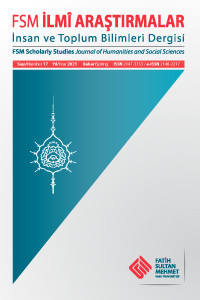Türkiye’nin Ortadoğu Ülkeleriyle Ekonomik İlişkilerinin Gelişmesinde Kıbrıs Meselesinin Rolü
Cumhuriyetin ilan edildiği 1923 yılından sonra takip eden 40 yıl boyunca, Türkiye’nin
Anahtar Kelimeler:
Türk dış politikası, dış ekonomik ilişkiler, Ortadoğu, Kıbrıs Meselesi
The Role of the Cyprus Issue in the Development of Economic Relations Between Turkey and Middle Eastern Countries
Throughout the following 40 years after the year 1923 when the republic was proclaimed,Turkey’s political and economic relations with Middle Eastern countries wereshaped in the profile of a country that was entirely within the Western bloc. That wasbecause Turkey had adopted a foreign policy that we can summarize as being neither analternative nor a dissident to the emerging Western axis, but becoming a part of it.As the relations between Turkey acting in accordance with this policy and the Westernworld grew stronger, the ties between Turkey and the Middle Eastern countries graduallyweakened. The fact that the positive steps taken in the name of convergence withthe countries in the region were again aimed at the purpose of Westernization had madethe existing picture for these countries worse.The changing world dynamics after the World War II completely severed the tiesbetween Turkey and the Arab countries, which are its close neighbors, and other Muslimsocieties as Turkey had made an effort from 1945 onward, this time more firmly, toconverge towards the West and primarily the United States. Because during this period,Turkey had faced the Soviet threat and needed the West’s support with security concerns.On the other hand, there was an emerging Anti-Westernism in the Middle East countrieswith the strengthening nationalist movements. Moreover, they had no perception of athreat from the Soviets.The gap between Turkey and the Middle Eastern countries deepened gradually untilthe mid-1960s. From 1960 onwards, consecutive developments resulting in the closingof this gap and advancement in political, then economic relations with the countries inthe region emerged. Turkey’s big disappointment resulting from the Johnson letter, whichprevented a planned military intervention to Cyprus in 1964 and the negative result fromthe voting on Cyprus at the UN enabled it to abandon the Western guided foreign policyand implement a versatile foreign policy with alternatives. The most important applicationarea of this fundamental change was inevitably the Middle Eastern countries.In this article, the change in our Middle East policy that started in 1964 and becameincreasingly evident with the 1973 Oil Crisis and the 1974 Cyprus Peace Operation willbe discussed and the reflections of this policy change on our economic relations will beemphasized.
___
- Abdülfazıl, Mahmud, “Türk-Arap Ekonomik İlişkileri; Fırsatların ÖnündekiÇıkmazlar ve İmkanlar”, Arap-Türk İlişkilerinin Geleceği Sempozyumu Bildirileri,İstanbul, 1994.
- ISSN: 2147-3153
- Başlangıç: 2012
- Yayıncı: Fatih Sultan Mehmet Vakıf Üniversitesi
Sayıdaki Diğer Makaleler
Aile Yeterlik Ölçeklerinin Türkçe’ye Uyarlanması, Geçerlik ve Güvenirliği
Tuğba Yılmaz BİNGÖL, Melek KALKAN
Osmanlı Tefsir Geleneğinde Besmele Risaleleri Literatürü
Schumpeter ve Ülgener’in İktisadi Krizlere Bakış Açıları
Özer ÖZÇELİK, Ezgi Babayiğit SUNAY
Usûl, İmkân ve İhtiyaç Açısından Çocuk Yaştaki Râvilerin Hadis Semâı
Nizamüddin Ömer b. Ali el-Merginânî ve Cevâhiru’l-Fıkh Adlı Eserindeki İstidlal ve Tercih Yöntemleri
Şeyh Bekir’in Şifâ’ü’l-Kulûb ve Ziyâ’ü’l-Kubûr Adlı İlmihal Eseri
Türkçe-Arnavutça Manzum Sözlük Dürre-i Manzûme’nin Bilinmeyen İki Nüshası
